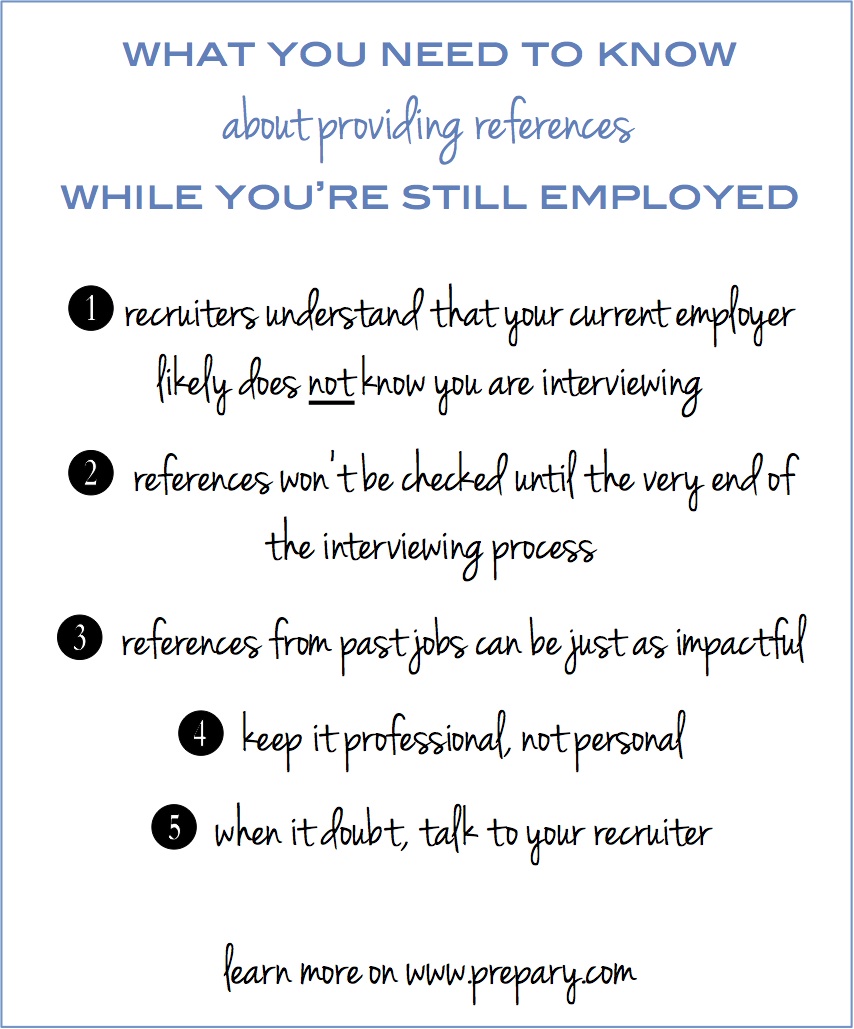When you are going through the process of interviewing for a job, you will be asked for references. While it’s always a tough to decision to determine what references you’ll provide, it really gets sticky if you’re still employed. When providing references while still employed, do you need to include your current employer? This… is the big question!
The part that this makes this situation even more sticky, is that sometimes references are asked for at the time of application. You don’t even know if you are going to get an interview and you have to give up the contact info of your current employer!? I definitely see why people get uneasy.
Based on my time as a recruiter, here are my thoughts about providing references while still employed:

The company you are applying to/interviewing with WILL understand that your current employer doesn’t know you are interviewing and therefore, they won’t be used as references
This is often the case and most recruiters are used to that. In the recruiting world, your confidentiality is taken very seriously and it is extremely unprofessional to call up a current employer without your permission. Basically, current employers are “off limits” in terms of reference checking most of the time. Especially if you are asked for this information up front (before even getting into the interview process) feel free to not provide this. You might also notice a part on the application that says “do not contact my current employer” so always check that box if you do provide the information.
References are almost never checked until the end of the process
Even if you provide references while you are filling out an application, they will likely not be called until you are about to be hired (or at least under serious consideration). Why? Because reference checking takes time (an annoying amount of time!) and recruiters are not going to want to spend time hearing all about you unless they are pretty serious about hiring you. At that point, you’ll have a relationship with your recruiter and can explain that the references you are providing are not from your current job since they are not aware you are looking. If the recruiter needs different references than who you’ve provided, they will ask you that specifically.
References do not have to be from your current job in order to be impactful
People tend to get very stressed if they can’t provide a reference from their current job. Don’t worry! References from past roles can still be very impactful. A reference from a former supervisor (or the head of your team) will be a lot more useful than one from the one person you trust at your current job who you don’t work with closely. In general, the best references are former supervisors because they have worked the most closely with you and would probably be the most critical.
Keep it professional, not personal
No matter what, a professional reference is always better than a personal one. Personal references (unless specifically asked for) can be seen as a bit of a cop out. People want to know about your character for sure, but they want to know about it relative to the workplace (vs. socially).
When it doubt, talk to your recruiter
If you are having trouble providing references for any reason, leave them blank for the moment and have a conversation with your recruiter. They will be able to help you navigate the process and give you guidance on providing the types of references they are looking for. They are familiar with all kinds of situations and definitely open to having a conversation about this part of the process.
Hopefully this post has helped put you at ease about providing references while you’re still employed. Any other questions on this topic? Leave a comment and we’ll get them answered!





